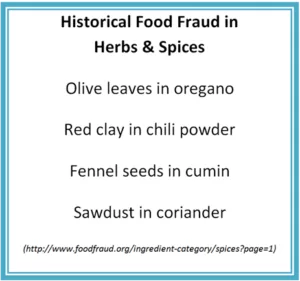Waters COI Partner brings food fraud into the spotlight again


Global trading of herbs and spices can be traced back for thousands of years. Historically they were considered a rare and precious commodity, but methods to determine their authenticity were only very basic, creating a compelling incentive to substitute with lower-value products with a low risk of the adulteration being discovered.
This is clearly not just a historical issue, as recently the authenticity of oregano has been the focus of the media spotlight. Research conducted by Prof. Chris Elliott, Director of the Institute for Global Food Security and a Waters Centers of Innovation Program partner, showed that up to 70% of a sample of oregano contained fraudulent ingredients (such as olive or myrtle leaves). While not as concerning as some of the herb and spice adulterations seen throughout history (see table below), food fraud is still clearly a serious issue for consumers and the wider food industry, with an estimated annual cost of $11 Billion globally.
 As Prof. Elliott suggests, the complexity of today’s global supply chains, as well as increasing economic pressures, may increase the opportunities to commit food fraud, forcing manufacturers and regulatory agencies to re-examine testing methods.
As Prof. Elliott suggests, the complexity of today’s global supply chains, as well as increasing economic pressures, may increase the opportunities to commit food fraud, forcing manufacturers and regulatory agencies to re-examine testing methods.
Waters is pioneering new, direct sampling techniques that allow scientists to analyze the surface of a sample (without the need for time-consuming sample preparation or chromatography) to instantly determine a molecular profile. The implications of this technology are vast. Improving access to effective testing methods through a simple-to-operate system that dramatically reduces the time-to-result can have a significant impact on the discovery of food fraud and the identification of adulterants in food.
Popular Topics
ACQUITY QDa (16) bioanalysis (11) biologics (14) biopharma (26) biopharmaceutical (36) biosimilars (11) biotherapeutics (16) case study (16) chromatography (14) data integrity (21) food analysis (12) HPLC (15) LC-MS (21) liquid chromatography (LC) (19) mass detection (15) mass spectrometry (MS) (54) method development (13) STEM (12)


